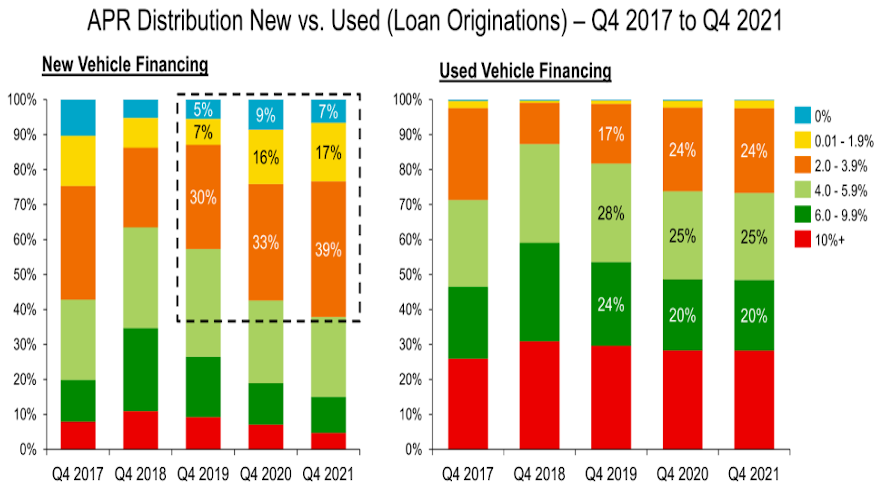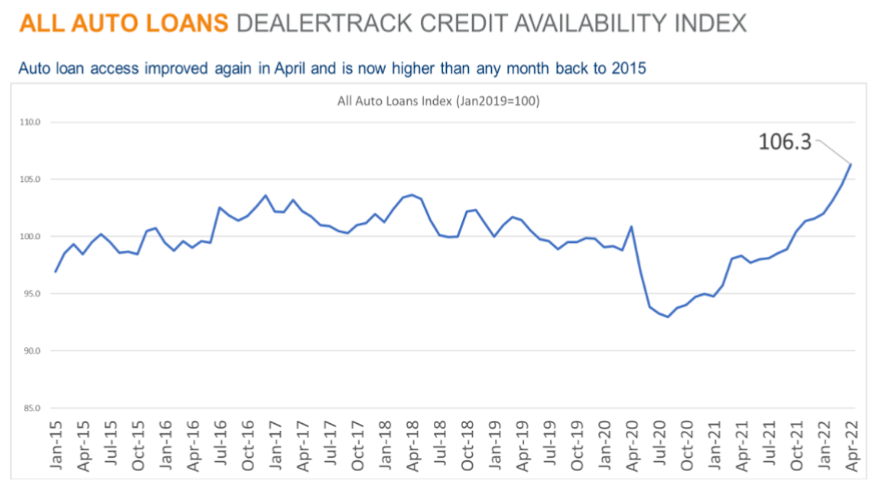The auto portion of TransUnion’s Q4 2022 Quarterly Credit Industry Insights Report (CIIR) included a metric that dipped to its lowest reading in nearly a decade.
Viewed one quarter in arrears to account for reporting lag, TransUnion reported this week that auto finance originations in the third quarter of 2022 softened by 9.8% year-over-year to 6.6 million, representing the lowest seasonal volume since 2013.
Analysts explained this reading represented the second consecutive year that …
Read more
Launcher recently finalized another partnership to help finance companies shore up their underwriting.
The technology provider specializing in originations announced an integration of Launcher’s appTRAKER Loan Origination System (LOS) with Truework, which provides immediate access to income and employment data for more than 35 million employees.
With appTRAKER LOS, the Launcher team wanted to create a more efficient way for finance companies to consume data.
“Ultimately the quality of data used during the loan origination process helps those lenders to build more profitable portfolios,” Launcher said in a news release.
The integration with Truework can help accelerate applicants through the conversion funnel, giving fast and accurate income and employment results, effectively speeding up the underwriting process.
The companies highlighted that more users are seeing the value that Truework brings in reducing costs, automating the process, and converting more applicants.
The service providers also pointed out that increasing competition paired with market uncertainty has driven demand for more robust and accurate data sets to build more resilient underwriting models, especially in this time of market slowdown.
When used within appTRAKER LOS, finance companies automatically can access employment and income information, helping to reduce time and errors that incur risk in a manual process.
Launcher president Nikh Nath indicated that structured workflows and automated processes can be built around this data, ensuring finance companies can consistently meet their requirements.
“Adding Truework to our list of integration partners has been invaluable for our clients who are looking for a good source of income and employment verifications,” Nath said in the news release.
“We take pride in our team’s and system’s ability to be agile enough to integrate with almost any vendor for data consumption. Our lenders utilize the automated processes offered by this integration during originations to take advantage of the quality and flexibility provided to book loans quickly and efficiently,” Nath continued.
Truework is on track to power more than 12 million income and employment verifications, servicing more than 20,000 small businesses and 100 enterprises.
“We’re excited to be partnering with Launcher to bring innovation to income and employment verification in the auto lending space,” Truework CEO Ryan Sandler said.
“Lenders are increasingly looking for more cost-effective and technology-driven solutions and we’re looking forward to working with Launcher to educate their customers on the many advantages of Truework’s VOIE product,” Sandler went on to say.
Last week, both Kroll Bond Rating Agency (KBRA) and S&P Global Ratings shared intriguing findings based on analysis of September and October data generated by the automotive securitization market, noting trends about originations, extensions, collections and delinquencies.
SubPrime Auto Finance News obtained additional information from S&P Global Ratings, which said in a news release, “U.S. ABS prime auto loan performance strengthened in September 2022, recording …
Read more
Reinforcing what Cox Automotive and other experts are seeing from a retail perspective, TransUnion’s Q3 2022 Quarterly Credit Industry Insights Report (CIIR) showed how much auto finance originations are slowing.
According to the report released on Tuesday, TransUnion said originations in the second quarter of this year (viewed one quarter in arrears) declined …
Read more
While mentioning an overall uptick in products being used by consumers falling into the non-prime credit category, the auto portion of TransUnion’s Q4 2021 Quarterly Credit Industry Insights Report (CIIR) contained information and insights that finance companies might find encouraging.
In light of reduced vehicle inventory and semi-conductor chip shortages, TransUnion indicated year-over-year origination rates remained flat in Q3 2021 at 7.3 million as originations are viewed one quarter in arrears to account for reporting lag.
As a result of low supply and high demand, vehicle affordability and pricing have been impacted, TransUnion tabulated the average balance of an installment contract — including both new and used — grew to $26,976 during the third quarter, representing a 14% increase year-over-year
TransUnion mentioned average monthly payments have also been affected by the current environment, increasing from $459 in Q3 2019 prior to the pandemic to $531 in Q3 2021.
“Dealerships continue to face challenges around vehicle supply, and while originations held relatively flat in Q3 2021, uncertainty surrounding when inventory issues might be resolved continue to hang over the auto industry,” said Satyan Merchant, senior vice president and automotive business leader at TransUnion.
“We expect this, coupled with rising vehicle prices across both used and new vehicles, will impact auto sales through the remainder of 2022. Consumer performance, however, remains at healthy levels — especially as the majority of pandemic forbearance programs have expired,” Merchant continued in a news release.
Q4 2021 Auto Loan Trends
|
Auto Lending Metric
|
Q4 2021
|
Q4 2020
|
Q4 2019
|
Q4 2018
|
|
Number of Auto Loans
|
82.4 million
|
83.5 million
|
83.8 million
|
82.0 million
|
|
Borrower-Level Delinquency Rate (60+ DPD)
|
1.59%
|
1.57%
|
1.50%
|
1.45%
|
|
Prior Quarter Originations*
|
7.3 million
|
7.3 million
|
7.5 million
|
7.1 million
|
|
Average Monthly Payment**
|
$531
|
$473
|
$459
|
$443
|
|
Average Balance
of New Auto Loans*
|
$26,976
|
$23,671
|
$22,223
|
$21,510
|
|
Average Debt Per Borrower
|
$21,210
|
$19,791
|
$19,183
|
$18,833
|
*Note: Originations are viewed one quarter in arrears to account for reporting lag.
**Data from IHSM Catalyst, information is viewed one quarter in arrears.
Source: TransUnion
Update on personal loans
Meanwhile, another financial services segment often used by consumers who might be below the prime credit segment is gaining volume.
TransUnion determined the personal loan market has markedly rebounded since lenders pulled back during the early quarters of the pandemic.
The report showed origination volumes have returned to pre-pandemic levels with 5.1 million in Q3 2021, exceeding the 5.0 million loan originations in Q3 2019.
TransUnion said the average new account balance grew by 23.8% year-over-year to $7,104 in Q3 2021. This growth helped drive personal loan balances to a total of $167 billion in Q4 2021 — an all-time high, according to TransUnion.
“The consumer lending market has returned to pre-pandemic levels, with balances even exceeding Q4 2019 numbers. Strong origination volumes, especially in below prime segments, coupled with material balance growth is an indication of lender confidence in consumer financial health,” said Liz Pagel, senior vice president and consumer lending business leader at TransUnion.
“While the increase in subprime originations has led to a slight increase in delinquencies, they still remain well below pre-pandemic levels, and delinquencies by risk tier remain fairly stable,” Pagel continued in the news release.
Overall credit activities
With consumer credit performance maintaining healthy levels across auto, credit card, personal loans and mortgages, TransUnion said finance companies and other lenders continued to ramp up new account origination growth in the non-prime segment of the market near the end of 2021.
TransUnion also found that loans to non-prime borrowers increased while accounts originated during the pandemic in 2020 continued to perform as well or better when compared to loans from previous years.
The credit card market, in particular, saw a very high rate of new account growth in Q3 2021, which is latest data available to TransUnion, with a record 20.1 million originations, 9.0 million of which were to non-prime consumers.
Overall card originations in the quarter grew 63% year-over-year, while non-prime originations increased 75% year-over-year from the 5.1 million non-prime originations that occurred in Q3 2020.
TransUnion reiterated that the non-prime risk range in its database includes the subprime risk tier (defined as a VantageScore 4.0 range of 300-600) as well as the near-prime risk tier (score range of 600-660).
“There was a great deal of uncertainty in the initial months of the pandemic, and many lenders opted to take a wait and see approach. Adding to the uncertainty was the jump in consumers in loan accommodation programs, and questions on how those consumers would perform once they exited those programs. Lending to below prime consumers was suppressed and financial institutions turned their focus to the prime areas of the market to help mitigate risk,” said Charlie Wise, senior vice president of research and consulting at TransUnion.
“Toward the end of 2021, the majority of accommodation programs have expired and lenders have seen that consumers continue to perform well on their credit obligations. Lenders are eager to pursue growth, including expanding back into the non-prime consumer segment,” Wise went on to say.
Exeter Finance is closing the year with a pair of notable developments announced on Tuesday.
The finance company that specializes in subprime paper said it will extend its underwriting reach into the near-prime credit spectrum, effective immediately. Focused on non-prime since its founding in 2006, Exeter launched a new near-prime program called ExeterPlus to dealers nationwide.
“We’re excited that after establishing a track record of success in non-prime auto financing over the past 15 years, Exeter has launched its new near-prime program, ExeterPlus. The program will offer dealers flats, an extended max term and increased back-end,” Exeter president and chief operating officer Brad Martin said in a news release.
Martin noted that Exeter has helped more than 1 million customers purchase the vehicles they need since 2006.
Now, Martin said the company is looking forward to helping its next million customers through “competitive offerings that are right for them — and for its dealer partners, as well.”
Exeter’s announcement follows the closing of the company’s sale to an investor group led by Warburg Pincus.
Terms of the private transaction were not disclosed, according to that news release distributed Tuesday.
Exeter did mention that Jason Grubb continues as chief executive officer and is a “meaningful investor in the company,” alongside Martin and the rest of the current Exeter management team.












